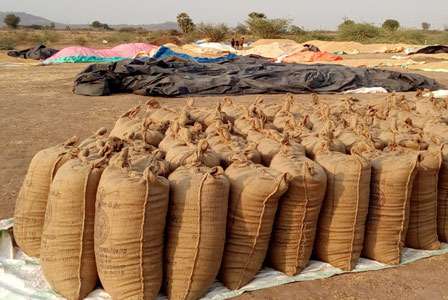Paddy procurement is arguably the most important agri-business activity in the state that runs for five months in two phases with a nearly two months’ gap. It constitutes a key part in the state’s overall economy. This year, the state government has maintained more or less the same procurement target. It will procure 71 lakh MT of paddy – a rise of just 50,000 MT from last year. Ever since Odisha was declared a decentralised procurement (DCP) state in 2004, the volume of procurement has been gradually going up with every passing year. The Odisha State Civil Supply Corporation (OSCSC) is the nodal agency for procurement here.
From mere 5-6 lakh metric tonnes in 2004-05, the size has gone up to over 70 lakh (MT), which works out to approximately 45 lakh MT of rice per year. The uptick in the volume indicates a rise in production and a corresponding rise in consumable surplus. What does this rise in target indicate? In the absence of minimum support price (MSP) for other crops, farmers have no option but to cultivate paddy on maximum land that they own. However, the flawed system deprives many farmers of availing the benefits of MSP. First, the government is not very keen to augment the size of paddy procurement. It spends over Rs 12,500 crore every year on buying paddy from farmers at MSP. Add to that other incidental expenses like money spent on gunny bags and administrative expenses.
While the Centre is supposed to bear the entire financial burden of MSP, the OSCSC borrows the funds upfront from banks to buy paddy. In recent years, the Centre has delayed releasing the funds to OSCSC and this has resulted in ballooning the loan and the consequent interest. This is the prime reason why the corporation is not showing much interest to increase the volume of procurement. While farming is the main calling of over three-quarters of people in Odisha, an overwhelming majority of them cultivate paddy as the crop is supported by MSP. Yet, there has not been a single year when the MSP delivery has been hassle-free. Like in the past, this year also farmers in western Odisha are up in arms against the token system. The system mandates that farmers wishing to avail MSP must secure tokens 15 days prior to sale. The date of sale and the quantity of paddy to be sold are mentioned in the token that is sent to the farmer through his/her mobile number.
Beneficiaries regardless of where they live have to register themselves with the centralized system that is operated from Bhubaneswar. The system has proved counter-productive. Farmers are forced to store their produce waiting for tokens and the prolonged wait dries up the crop resulting in loss of weight. Farmers have no idea when they will get the elusive tokens. The system more often than not malfunctions. Farmers who have not even harvested their paddy are given tokens while those post-harvest keep waiting for tokens. The government must review the token system. There have been protests by farmers in Bargarh and Kalahandi where procurement began last week. Protests may intensify as the system is delaying procurement. Adding to the mess are incidents of middlemen getting tokens by enlisting the names of fake farmers. In Jeypore, bogus farmers have been registered by middlemen to avail the benefits of MSP.
The token system must be reviewed forthwith as it is inherently faulty. It is difficult for people sitting in Bhubaneswar to know when the farmer in a village in Bargarh will harvest his paddy and sale it. Further, the size and yield of harvest is different in different parts of the state. Therefore the policy of one size fits all may not be ideal. The urgency of sale and the logistics involved in the exercise can be better handled if the decision-making power is vested with local level authorities.
The centralized system has made the process rather sluggish. Farmers are made to watch their stocks at market yards during day and night in winter as they wait for their tokens. Lured by higher MSP (Rs 2500/quintal) in Chhattisgarh, traders are seen falling head over heels to buy paddy from western Odisha. Higher MSP in the neighbouring state has always attracted traders/middlemen to buy paddy from Odisha at lower rates and sell it in Chhattisgarh at a premium. The token system is pushing farmers to traders leading to distress sale. This is time the government reviewed the system.
